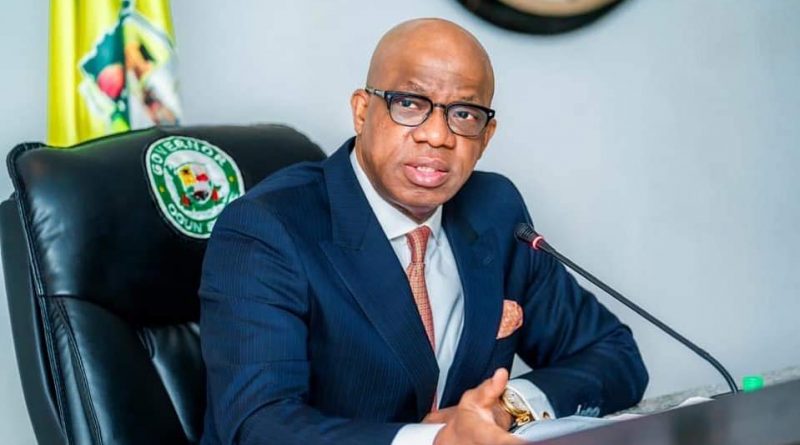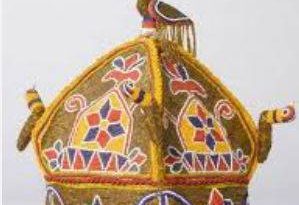Desperate Ad Hominems And Abiodun’s Graceful Strides
By Ismail Rasheed
Homer’s Iliad, a vast volume of works that essentially underpin Greek mythology may date back to the 8th century BCE, but there are still numerous tropes in the classic tales seemingly written for contemporary times. Indeed, there appears to be a tale from Greek mythology for whatever hubris and shenanigans seen in Nigeria’s politics today.
For a while now, I have struggled to make sense of an unrelenting smear campaign targeting the Ogun State governor, Prince Dapo Abiodun. Each time I tried to fathom what the motive could be, the more perplexed I got.
However, given that such plots almost always tend to unravel, I reckon that the Myth of Sisyphus somewhat explains this mindless muckraking.
Sisyphus was a legendary king of Ephyra (later known as Corinth) eternally condemned to roll a heavy rock up a hill, only to have it roll down as it nears the top, whereupon the task is repeated.
In trying to situate the rage against the Ogun State governor, it’s important to view it in the context of the peculiar hurdle he had to scale in 2019 to secure his party’s ticket and, ultimately, the governorship. To supporters of the All Progressives’ Congress in Ogun State, Abiodun may have seemed like the heir apparent on account of his political pedigree and immense contribution to the party. But the incumbent had some other ideas. Abiodun prevailed nonetheless.
If the party’s ticket secured in spite of the then incumbent’s well-known aversion felt like an ego-bruising humbling, Abiodun’s eventual defeat of that preferred candidate – corralled as it were into a rival party and supported openly by the incumbent – was even more so.
So, what’s the fuss about seeing one’s candidate lose an election? The answer is simple: no where else do egos come as big as they are in politics. Also, hell apparently has no fury like a chastened godfather knocked off their perch, and denied the sense of entitlement to which they had grown accustomed. The humiliation has to be requited somehow. Therein lies the roots of the pull-Dapo Abiodun-down-at-all-cost project.
But when an obsession is fuelled by malice, hate and envy, truth is often the first casualty. And, as history shows, pursuits built on falsehood falter inevitably. From the doctoring of interviews to suit a sinister agenda to suborning hacks to write slanderous stories and instigating a desperate plot to disqualify Abiodun from the party primary over spurious allegations, the task to malign Governor Abiodun is akin to rolling a huge boulder up a hill. Like Sisyphus’ futile bid, the attempts have mostly come to nought.
Peeved by these egregious attempts to assail Governor Abiodun’s reputation, a social and democracy advocacy group, Movement for Democratic Progress (MDP), recently urged the national leadership of the All Progressives Congress (APC) to call a former governor and senator representing Ogun Central in the state, Ibikunle Amosun, to order over what it called his series of anti-party activities in the state. A statement issued by the group’s Secretary, Adeyemi Ige, claimed the former governor was behind the crisis in Ogun State’s APC, noting that his aim was to sow discord in the party and disaffection towards the governor.
While it is common knowledge that there is no love lost between the Ogun State governor and his predecessor, it is unlikely the latter would acknowledge any role in the grand plot. But such disavowal will be a hard sell, given his utterly reprehensible spawning of his own party’s candidate (Abiodun) in the 2015 governorship election.
The MDP’s statement referenced earlier is particularly instructive: “Amosun, having sponsored a governorship candidate against the same party on which platform he contested and won a senatorial seat, was suspended from APC in 2015 but hurriedly pardoned. Despite this pardon, however, he has been making moves to destabilize Ogun APC after it became apparent that he had lost out in the power game.”
Equally instructive is how dignified Governor Abiodun has remained in the face of these scurrilous attacks. The repudiation he has chosen is not just silence; it is a silence that would rather let his accomplishments in office speak for him. There is no rebuke that stings deeper than constantly notching a better governance index which reveals, in very stark details, the inadequacies of one’s transducers, especially where they happen to be one’s own predecessor. Indeed, on the strength of his performance, Governor Abiodun is everything the former governor could not be – a visionary.
Despite being the state that shares a common boundary with Lagos, the socio-economic benefits that ought to accrue from this proximity had barely ever been utilized by Ogun State. Abiodun grasped quite early that the daily cross-boundary migration arising from this proximity makes a seamless transport system expedient. The Ogun State Multi-modal Transportation Master Plan conceived by his administration was meant to address that.
The multi-modal transportation masterplan incorporates road (the mass transit bus shuttle’s pilot project was launched recently), rail, water, and air transport components. The vision is to create an interface in a way that each transport mode doesn’t just exist in isolation, but complement one another in a somewhat unbroken chain for both intra- and inter-state commute.
With regard to rail transport, Ogun State has leveraged the benefits of its proximity to Lagos to strike an agreement that would see the ongoing rail project developed by the latter extended to the former. Essentially, the 37-kilometre Red Line (scheduled for completion in December this year) which runs from Marina, in Lagos, would extend to Ijoko and Kajola, both boundary communities in Ogun State’s Ifo Local Government Area.
This agreement also entails the extension of the 27.5-kilometre Blue Line rail project that runs from Marina through Okokomaiko, a high-density community on the outskirts of Lagos, down to Agbara, an industrial estate in Ogun State. It’s important to note that the Abiodun administration’s ongoing construction of the Atan Lusada road was conceived to maximally exploit the economic benefits that a rail line extension to this industrial heartland would yield.
No less pathetic is the fact that, over the years, the proximity to Lagos could not be maximized to boost Ogun State’s internal revenue. The reference to IGR is significant, as it is arguably one of the most reliable metrics via which a state’s growth could be gauged. In 2020, Ogun State was ranked fourth behind Delta, Rivers and Lagos. Although its position was still fourth on the half-year ranking for 2021, the state’s IGR figure experienced a 131.5% year-on-year growth. Such remarkable statistic eclipse every past record, in the same same way that these two infrastructure projects stand out as bold exemplars of commitment to an enduring future: the reconstructed Ijebu Ode-Epe Road, an arterial federal road that links the Lekki/Epe corridor of Lagos State to the eastern corridor of Ogun State; and the 42-kilometre Sagamu Interchange-Abeokuta Road.
To a very large extent, envy is essentially a natural human trait. There is hardly anyone who had never wished at some time that they were the one enjoying the adulation being showered on someone else, or that someone else’s achievements could be theirs. The real danger is letting such emotions to sire some very untoward thoughts that push one to obsess about another’s downfall.
It is interesting that the current mischief-peddling in Ogun State comes at a time the putative mastermind is nursing a presidential ambition. I would recommend that someone draws his attention to these wise counsel from the great Russian playwright, Anton Chekhov: “He who doesn’t know how to be a servant should never be allowed to be a master; the interests of public life are alien to anyone who is unable to enjoy others’ successes, and such a person should never be entrusted with public affairs.”
- Rasheed writes from Abeokuta.




